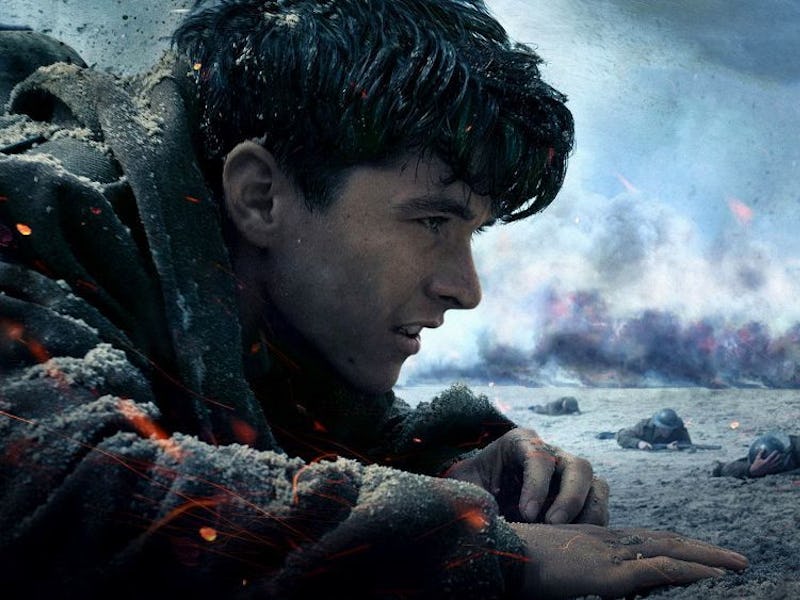Critics are Losing Their Minds for Christopher Nolan's 'Dunkirk'
Some are calling it Nolan's best film ever.

Christopher Nolan, the beloved director behind the uber-popular Dark Knight trilogy and Inception, returns to the big screen with a flourish in Dunkirk, where typical “war porn” is avoided in favor of a collection of fresh perspectives interwoven into a terrifying new look at war. Initial reviews are explosively positive, and critics are praising what’s essentially an entirely new kind of war movie that’s decidedly Nolan-esque.
Dunkirk is Nolan’s first major film since 2014’s cerebral but middling Interstellar, and for many reviewers, it’s Nolan’s best film in years.
Dunkirk follows soldiers from Belgium, the British Empire, Canada, and France in the early days of World War II as they’re surrounded by German forces and evacuated during the Battle of Dunkirk. To tell the complicated story of how these soldiers were transported to safety in a battle that Variety’s Peter Debruge calls “not a conventional victory, but more of a salvaged retreat,” Nolan unconventionally weaves disparate characters into one narrative.
Debruge calls it a “bravura virtual-eyewitness account from multiple perspectives — one that fragments and then craftily interweaves events as seen from land, sea, and air.” He goes on to point out how wildly different the subject matter is from the likes of Inception. Yet, somehow it’s easy to identify Dunkirk as “a Christopher Nolan film,” from “its immersive, full-body suspense to the sophisticated way he manipulates time and space.”
Writing for USA Today, Brian Truitt agrees that Nolan’s tale in Dunkirk comes from three very different perspectives:
“It’s less a movie and more a close encounter of the combative kind: You feel every bolt rattle in the cockpit of a dogfighting Spitfire, every stressful moment with the choice of drowning or surfacing in an oil fire, and every thought of certain doom for the infantrymen trapped on a beach when a bomb comes whizzing out of the sky.”
These stories don’t converge in any cohesive way until the end, which is a kind of narrative flourish so typical of Nolan.
Todd McCarthy at The Hollywood Reporter dubbed Dunkirk an “impressionist masterpiece,” calling it a “large” story that “conveys the whole through isolated, brilliantly realized, often private moments” rather than relying on “sheer spectacle.” The true villain in Dunkirk winds up being the viewer’s own empathetic exasperation:
“One of Nolan’s bold decisions is to never even show a Nazi; we see the result of the enemy’s aggression, especially from the air, but not once is a villain, or a swastika, offered up to function as a target for the viewer’s own aggressive emotion.”
Daniel Krupa of IGN explains that part of Dunkirk’s unorthodox success comes from a fresh perspective that avoids typical trappings of the war genre:
“Unlike other WW2 movies, such as Saving Private Ryan or the more recent Hacksaw Ridge, Dunkirk never lingers on gruesome shots of mangled corpses to convey the horror of war. In fact, “horror” isn’t the right word — Dunkirk evokes the sheer terror of it all; the huge, abstract forces surrounding and threatening to swallow the lives of ordinary people.”
It’s more about the terror of the predicament that many of these soldiers find themselves in:
“Similarly, characters never regale their peers with tales of back home or rouse them with perfectly measured speeches; they’re terrified young men, not much older than boys, trying to survive. That’s all you get, and all I really needed to know. The lack of individual character detail and development never hindered how much I feared for their safety.”
Peter Bradshaw with The Guardian echoes that sentiment by saying, “Nolan is not having any morale-raising laughter or chirpiness. His disaster is big; the stakes are high, the anxiety is unbearable.
Bradshaw goes so far as to call Dunkirk Nolan’s best film so far: “Nolan eschews war porn for a powerful and superbly crafted disaster movie.” He refers to the historical battle as “Britain’s great pyrrhic defeat or inverse victory of 1940,” citing Britain’s resilience amidst the impossible circumstances as a moral victory for their nation.
Dunkirk hits theaters on July 21.